Israelis Unsure Current Military Operation Will Bring the Hostages Home or Topple Hamas
48% of Jews do not think that the operation will lead to the return of the hostages, and 50% of Arab Israelis share this assessment. 50% of Jews also do not think that the operation will lead to an end of Hamas’s rule. Among Arabs, 41% do not believe that the operation will result in the defeat of Hamas.

Photo by Jamal Awad/Flash90
Methodology
The survey was conducted by the Viterbi Family Center for Public Opinion and Policy Research at the Israel Democracy Institute between May 26–29, 2025. It was based on a representative sample of the population in Israel aged 18 and above, comprising 601 Jewish interviewees and 150 Arab interviewees.
Main Findings
- In all four indicators of the national mood, this month saw a slight decline in optimism, with the largest decline found in optimism about the future of national security.
- Israelis’ sense of personal security has risen considerably relative to last year.
- Around two-thirds of the public think that when planning military operations, Israel should not take into account, or should only take into account to a small extent, the suffering of the Palestinian civilian population in Gaza. The opinions of Jewish and Arab respondents are opposed on this issue: Some three-quarters of Jews think that this suffering should not be taken into account, while around two-thirds of Arabs think that it should.
- Around two-thirds of the Jewish public oppose increasing the flow of humanitarian aid into Gaza. There are large differences between political camps: 75% of the Left support increased aid, compared with just 17% on the Right. Among Arabs, more than three-quarters are in favor of increasing aid.
- Around half of the Jewish public think that the responsibility for transferring and distributing humanitarian aid to the residents of Gaza should lie with an international force. Only around a quarter think that the IDF or another Israeli agency should take on this responsibility. Similarly, in the Arab sample, the largest share of respondents support giving this role to an international force.
- Around half of the Jewish public think that the Israeli media is not exposing Israelis to the true situation in the Gaza Strip. On the Left and in the Center, this is the view of a majority, while the Right is evenly divided between those who think there is full exposure and those who take the opposite view.
- Around half of the Jewish public think that the IDF’s latest military operation (“Chariots of Gideon”) will not lead to either the return of the hostages or the toppling of Hamas, while around 40% think it will achieve these aims in both cases.
- In the total sample, there is broad consensus that when planning military operations, decision-makers should take into account the burden placed on reservists and their families.
- Particularly among the Jewish public, there has been a considerable decline recently in the share of those who think that Israel’s security is one of President Trump’s central considerations when shaping his policy. Among Arabs, there is still a majority who think that Israel’s security is one of Trump’s main considerations.
- Both Jews and Arabs (to differing degrees) think that a ceasefire in Gaza is the development most likely to cause the Houthis to stop firing on Israel. Among Jews, the second most effective option is considered to be an Israeli attack on Iran, while among Arabs, a diplomatic agreement with the Houthis is ranked second.
- A majority of the total sample believe that foreign airlines have suspended their flights to Israel due to objective security considerations, while only a minority think that this step is due to disagreement with Israel’s actions in Gaza or to low demand for these flights.
This month, there were slight declines in all of the four indicators of national mood that we examine each month, which could indicate a more downbeat overall mood rather than a specific problem. In the total sample, the largest decrease was in the share of optimists about the future of national security (5 percentage points), which share is usually the largest among the four indicators (this time tied with optimism about the future of democratic rule). The smallest decline (2 percentage points) was in the share of optimists about the future of national cohesion, which is usually (as this month) the subject of the lowest rates of optimism.
There is a particularly large discrepancy this month between the share of optimists in the Jewish sample and in the Arab sample regarding the future of national security: While 41% of Jews are optimistic in this regard, only 18% of Arabs feel the same way. We found a difference in the opposite direction on the issue of national cohesion, with 32.5% of Arabs optimistic, compared with only 22% of Jews.
Optimistic about the future (total sample; %)
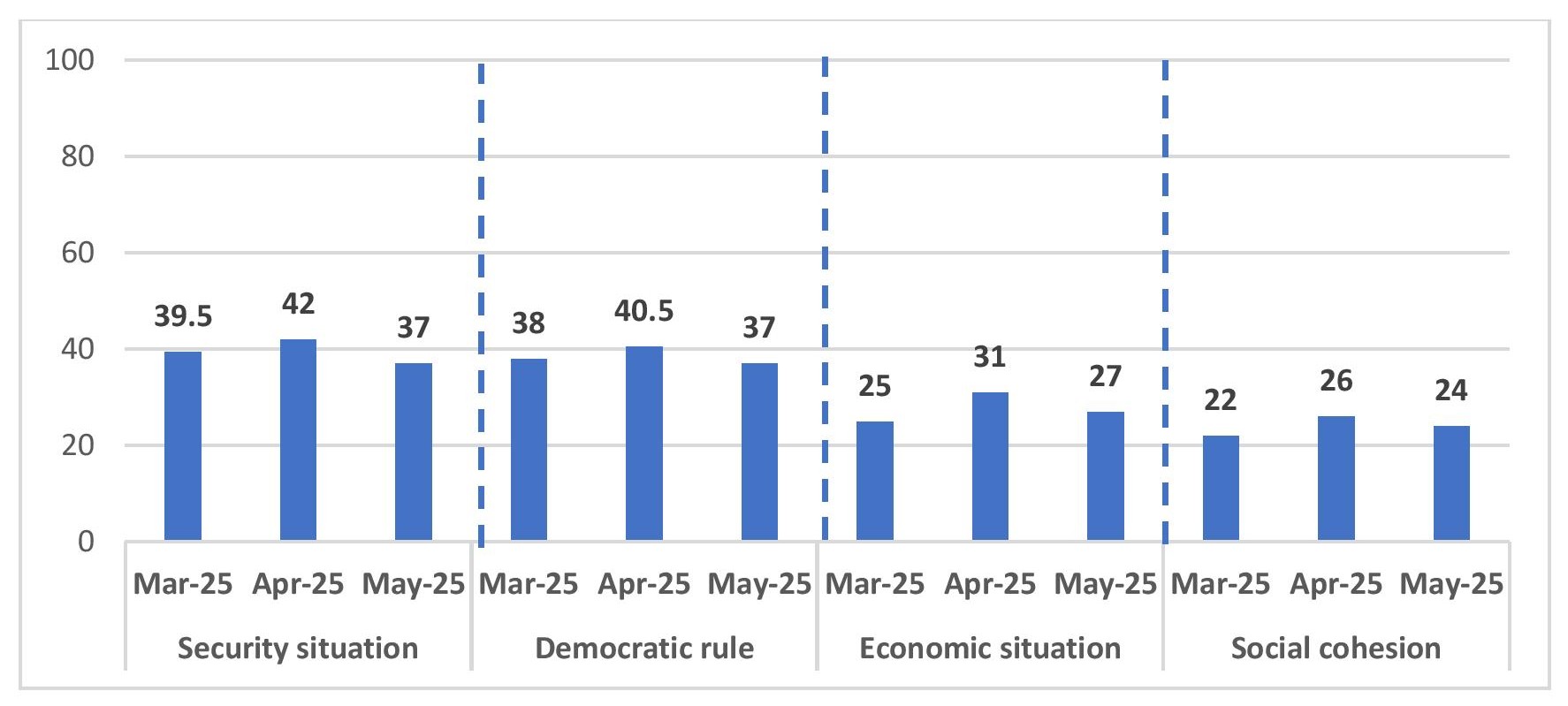
As in previous surveys, among Jews, those on the Left are the least optimistic, and those on the Right, the most optimistic. The Center, unsurprisingly, sits between these two, though its share of optimists is closer to that on the Left than on the Right.In this survey, the shares of respondents who identified themselves with each of the political camps were as follows: Left: 13.1%; Center, 24.1%; Right, 60.4%. These are very similar to the shares found in previous surveys (yearly average from May 2024 to May 2025: Left: 13.9%; Center, 24.6%; Right, 58.5%).
| %, Political orientation (Jews) | Future of democratic rule | Future of national security | Future of the economy | Future of social cohesion |
| Left | 11 | 16 | 5 | 6 |
| Center | 25 | 32 | 18 | 17 |
| Right | 48 | 51 | 37 | 28.5 |
To assess developments in Israelis’ sense of personal security, we repeated a question asked in May 2024: “How would you describe your sense of personal security today?” Among Jews, we found a clear increase in the share of those who define their sense of personal security as fairly high or very high (a total of 37% today, compared with 26% a year ago), and a clear decrease in the share who define it as fairly low or very low (26% today, compared with 41% last year).
The picture in the Arab sample is different, as the largest share of respondents still describe their sense of personal security as fairly low or very low. However, there has been an improvement here as well, with the share of respondents whose sense of personal security is fairly low or very low having fallen from 64% last year to 43% now. The share of those who described their sense of personal security as so-so has also risen, from 22.5% last year to 33% in the current survey, and the share who define it as fairly high or very high climbed from 13.5% last year to 24% this year.
Sense of personal security (%)
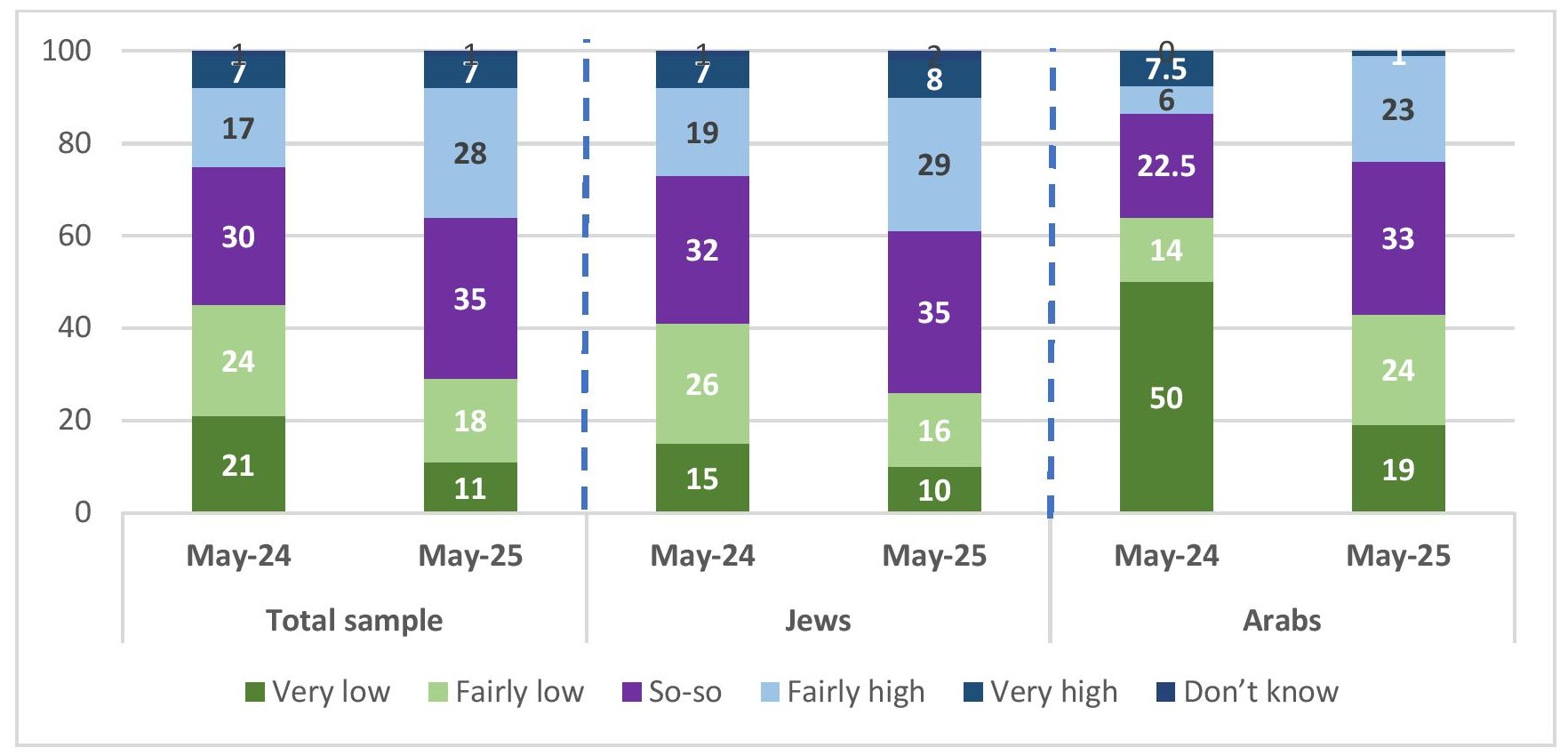
The increase in sense of personal security relative to last year is evident in all three political camps (Jews), though the largest share of respondents describing it as fairly low or very low is found on the Left, and the same camp has the smallest share who report a fairly high or very high sense of personal security.
Sense of personal security (Jews, by political orientation; %)
| Left | Center | Right | ||||
| May-25 | May-24 | May-25 | May-24 | May-25 | May-24 | |
| Fairly low and very low | 44 | 60 | 32 | 46.5 | 20 | 34.5 |
| So-so | 36 | 28 | 38 | 34 | 34 | 32 |
| Fairly high and very high | 18.5 | 12 | 29 | 18 | 45 | 32 |
| Don’t know | 1.5 | - | 1 | 1.5 | 1 | 1.5 |
| Total | 100 | 100 | 100 | 100 | 100 | 100 |
In this month’s survey, we repeated a question we asked in the final months of 2023 and in March 2024: “To what extent should Israel take into account the suffering of the Palestinian civilian population in Gaza when planning military operations there?” A clear majority in the Jewish sample (76.5%) think that Israel should not take the civilian population’s suffering into account at all, or should only do so to a fairly small extent, while in the Arab sample this picture is reversed, with the majority (67%) holding that it should be taken into account to fairly large or very large extent.
Looking at the trends over time, we see that there has been a moderate decline in the share of Jews who think that the suffering of the population in Gaza should not be a significant consideration. At the same time, there has been a slight increase in the share who think that this suffering should be taken into account to a large extent. Among Arabs, the share who believe that the suffering of the population in Gaza should be taken into account to a large extent has fallen significantly in this survey relative to March 2024, and especially when compared with the surveys from late 2023. This finding requires further examination, as it may reflect a one-time measurement rather than a steady pattern.
To what extent should Israel take into account the suffering of the Palestinian civilian population in Gaza when planning military operations there? (%)
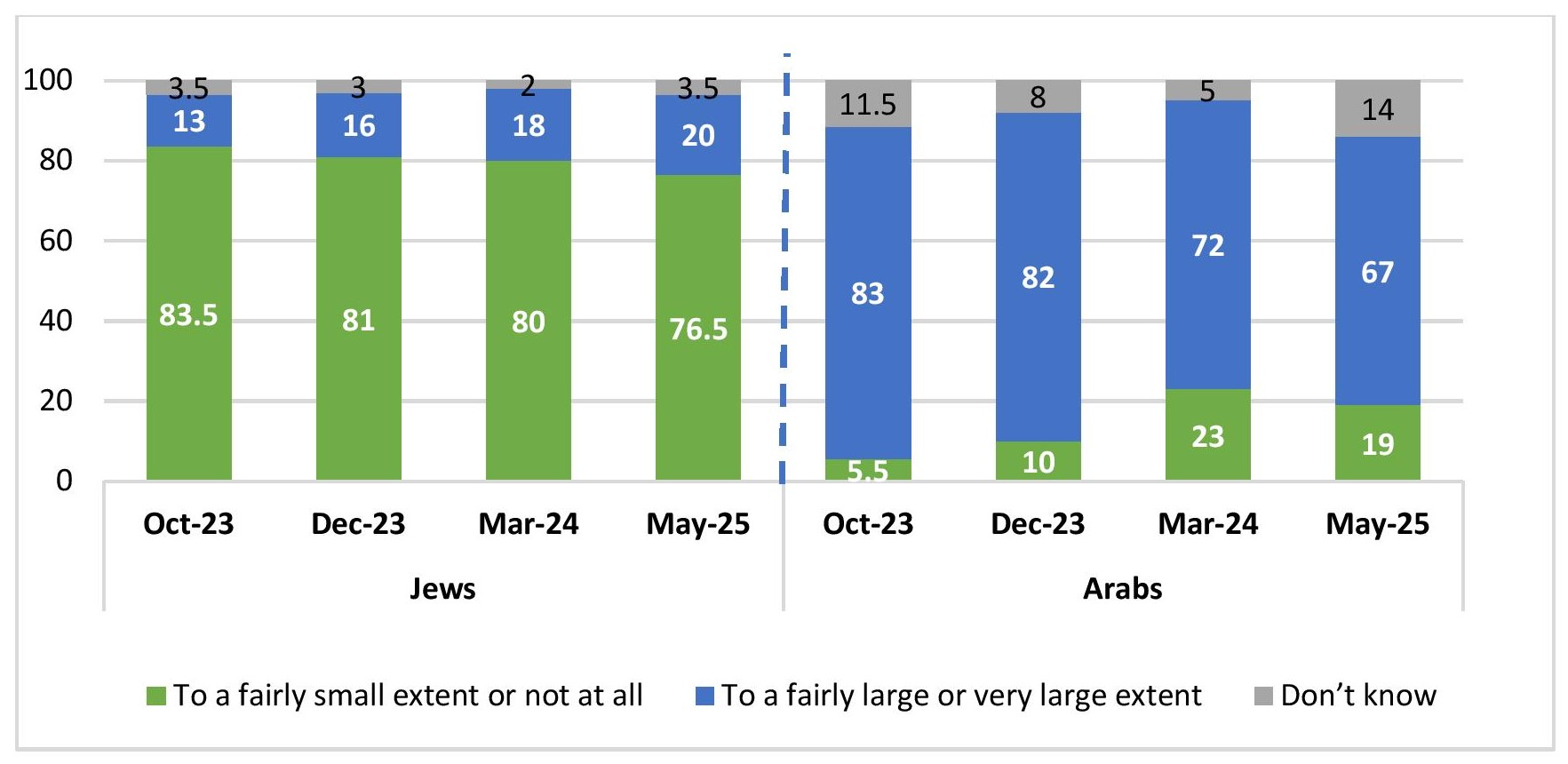
In light of the pressure being applied by multiple countries, we asked: “Should Israel increase the flow of humanitarian aid into the Gaza Strip?” In the total sample, 54% think or are certain that it should not, while 38% think or are certain that it should.
There are considerable differences between Jews and Arabs on this issue: More than three-quarters of Arabs think that the flow of humanitarian aid should be increased, a view held by less than a third of Jewish respondents.
Breaking down the Jewish sample by political orientation reveals very large discrepancies between the camps: While three-quarters on the Left think that aid should be increased, only 42% in the Center and 17% on the Right concur.
In light of the pressure from multiple countries, should Israel increase the flow of humanitarian aid into the Gaza Strip? (%)
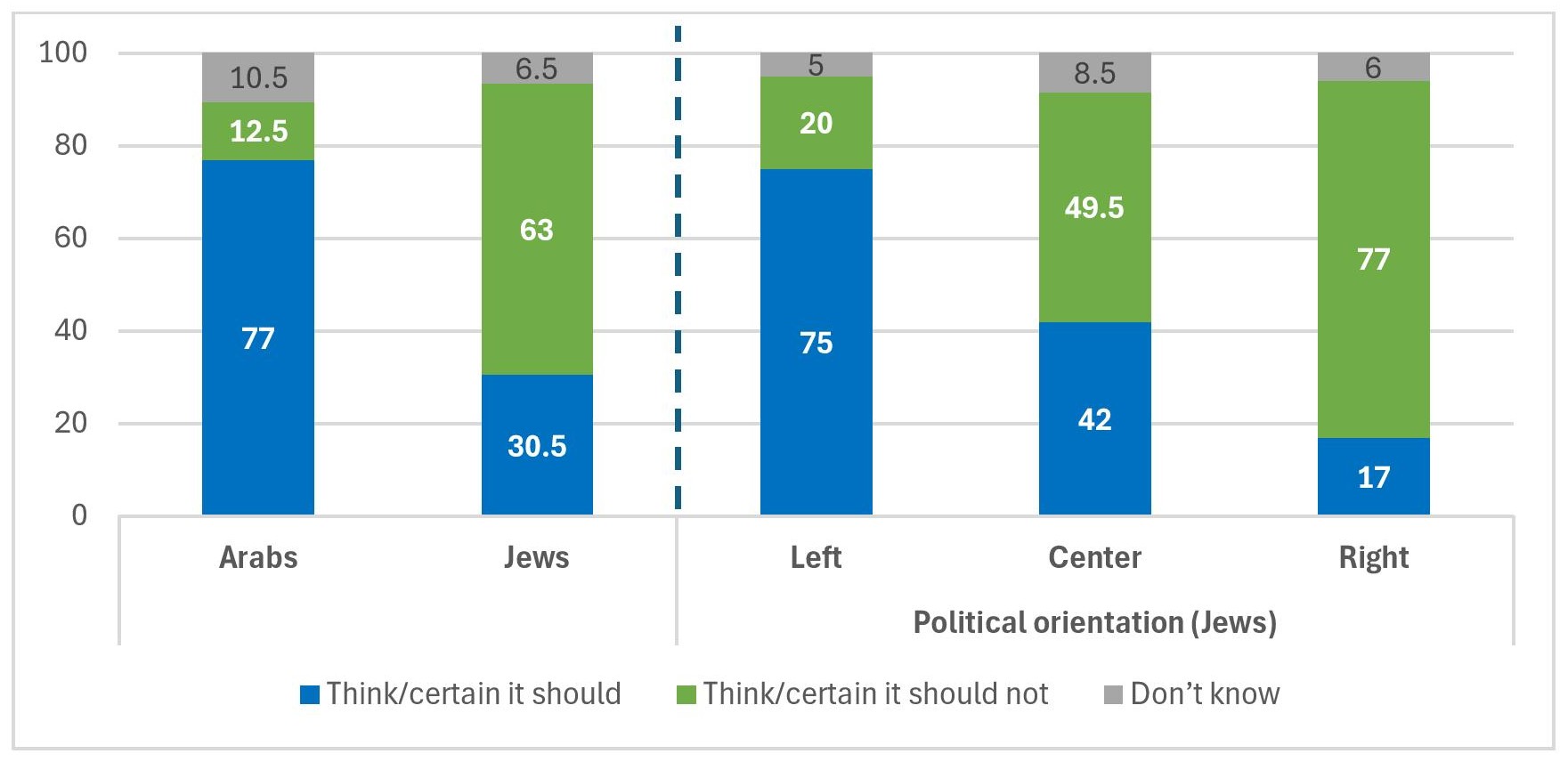
Around half the Israeli public think that the responsibility for transferring and distributing humanitarian aid to residents of the Gaza Strip should lie with an international force. Only around a quarter think this should be the responsibility of the IDF or another Israeli agency. Much smaller shares think that this task should be given to the Palestinian Authority (9%) or to private companies (8%).
Similar distributions can be seen in both the Jewish and Arab samples, though the share of Jews who think that the responsibility for aid should lie with Israel (IDF or other agency) or with an international force is larger than the equivalent share of Arabs. Support for giving this role to the Palestinian Authority or to private companies is higher among Arabs than among Jews.
Which do you think should be the main body responsible for transferring and distributing humanitarian aid to residents of the Gaza Strip? (%)
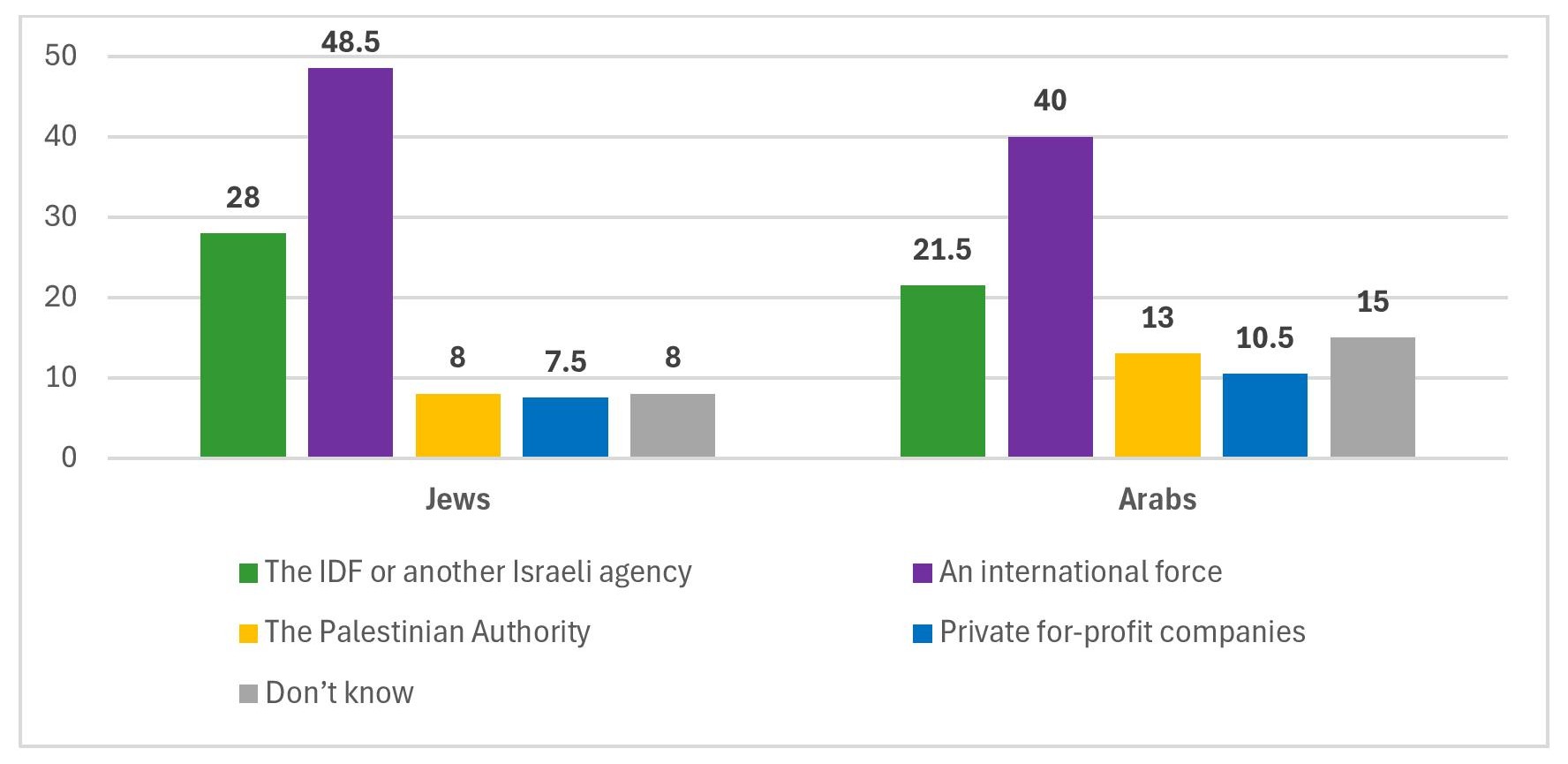
We cross-tabulated the responses to this question (in the total sample) with the responses to the question about increasing humanitarian aid to the Gaza Strip. We found that those who think that the flow of humanitarian aid should not be increased, and especially those who are certain it should not be increased (39.5%), are more likely to prefer that the IDF or another Israeli agency transfer and distribute the aid.
By contrast, those who believe that the flow of aid should be increased tend to support giving the responsibility for its transfer and distribution to an international force. Thus, among those who are certain that aid should be increased, only 19% prefer Israel to be responsible for distribution, compared with 51% who prefer an international force and 17% who prefer the Palestinian Authority.
| Total sample (%) | Should Israel increase the flow of humanitarian aid into the Gaza Strip? | ||||
| Which do you think should be the main body responsible for transferring and distributing humanitarian aid to residents of the Gaza Strip? | Certain it should | Think it should | Think it should not | Certain it should not | |
| The IDF or another Israeli agency | 19 | 16 | 28 | 39.5 | |
| An international force | 51 | 60 | 49 | 32 | |
| The Palestinian Authority | 17 | 8 | 6 | 9.5 | |
| Private for-profit companies | 4.5 | 7 | 10 | 8.5 | |
| Don’t know | 8.5 | 9 | 7 | 10.5 | |
| Total | 100 | 100 | 100 | 100 | |
Around a half of Jewish respondents (51%) think that the Israeli media is not presenting the true situation to the public (while 35% think that it is). The share of Arabs who hold this opinion is larger, at 59% (while 29% think that the Israeli media is indeed exposing the public to the true situation).
Breaking down responses in the Jewish sample by political orientation reveals that a large majority of those on the Left (80%) think the media is not presenting the true situation, a view shared by a majority of those in the Center (62%), while the Right is evenly divided between those who think the media is showing what it really going on and those who think it is not. It is worth noting the large proportion on the Right who selected the “don’t know” response (18%), possibly indicating doubts as to the reliability of reports in the Israeli media.
In your opinion, to what extent is the Israeli media exposing the public to the true situation of the residents of the Gaza Strip? (%)
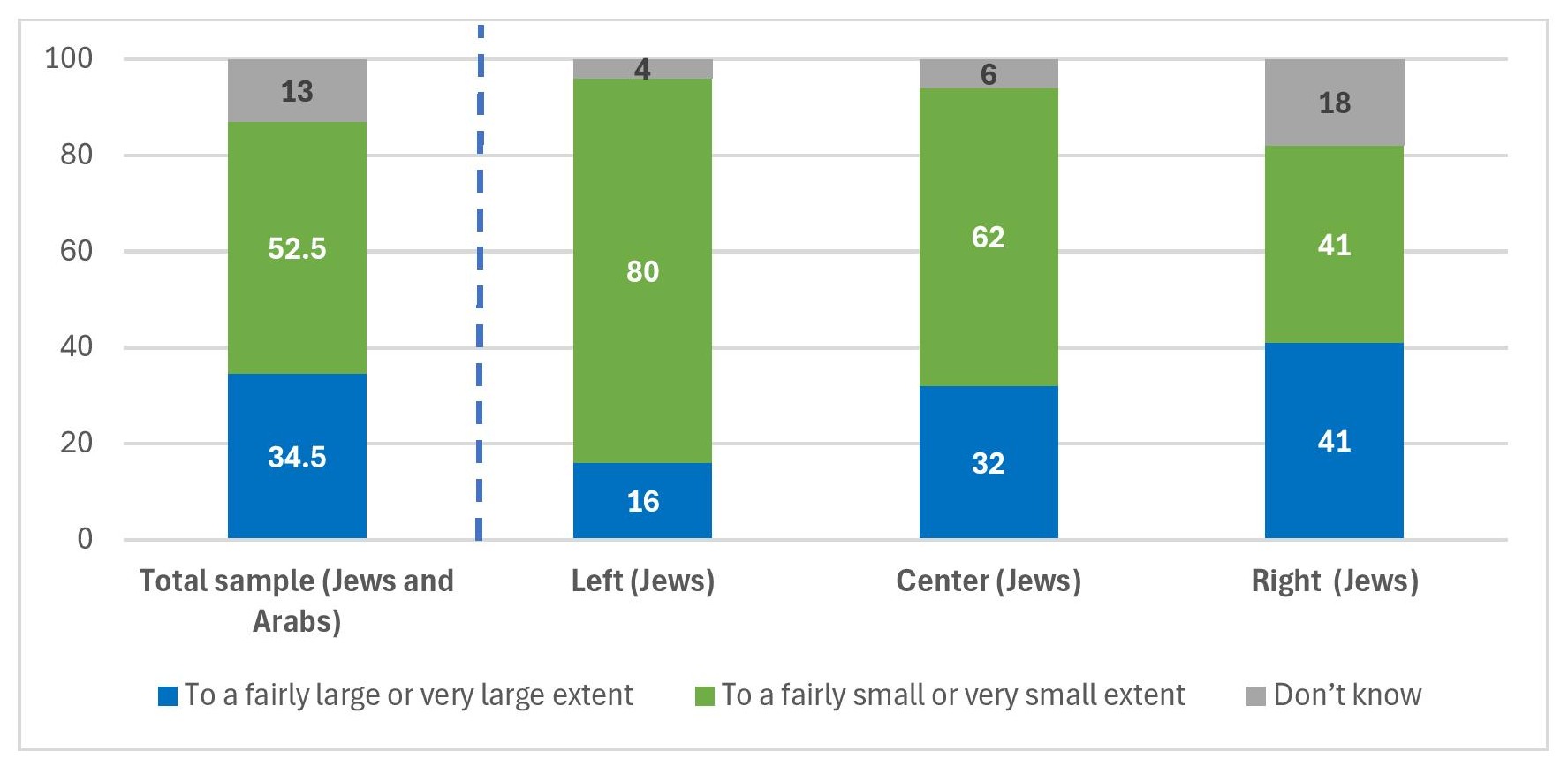
We asked about the likelihood that the IDF’s current operation in Gaza (“Chariots of Gideon”) will result in bringing the hostages home, and whether it will lead to defeating Hamas and ending its rule in Gaza. In both cases, the public’s expectations appear to be low.
Bringing the hostages home: About a half of both Jewish and Arab respondents think that the operation will not achieve this result. Only 39% of Jews think that the operation will lead to the return of the hostages, while the equivalent share of Arabs is even smaller (27.5%). A very large proportion of Arabs selected the “don’t know” response (22.5%).
Defeating Hamas and ending its rule in Gaza: 50% of Jews do not think that the operation will lead to ending Hamas’s rule, while 40% think that it will have this result. Among Arabs, 41% do not believe that the operation will result in the defeat of Hamas, while 31% take the opposite view, and an even larger share than in the previous question opted for the “don’t know” response (28%).
In your opinion, will the IDF’s current operation in Gaza (“Chariots of Gideon”) lead or not lead to bringing the hostages home and to defeating Hamas and ending its rule in Gaza? (%)
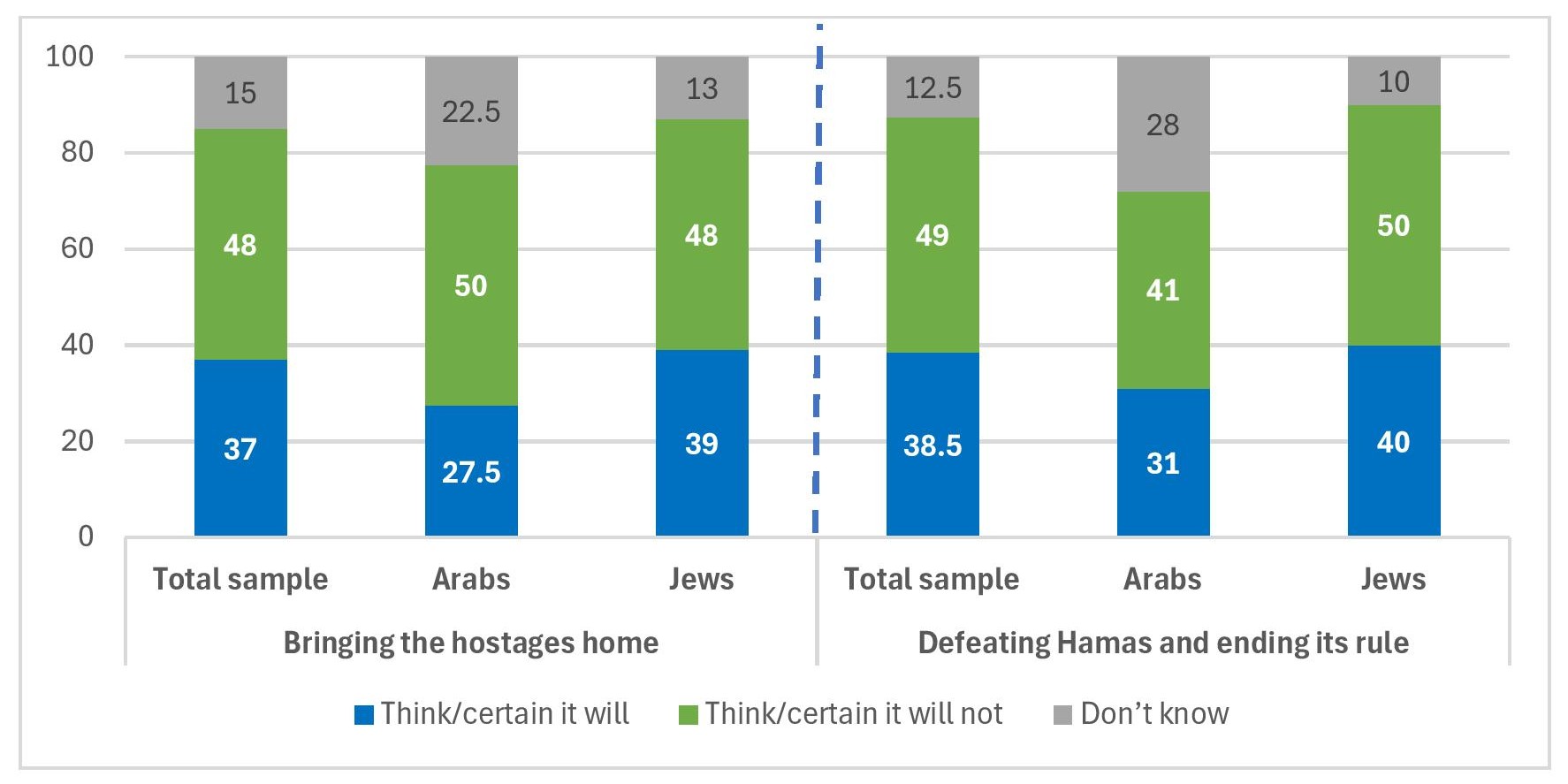
Breaking down responses in the Jewish sample by political orientation reveals considerable differences between the three camps, but great similarity within each camp in terms of responses to each of the two questions. On the Right, more than half believe that the operation will lead to both the return of the hostages and the defeat of Hamas. In the Center, only about a quarter believe that each of these goals will be achieved, while on the Left, only a tiny minority hold this view.
A breakdown of the total sample by voting in the 2022 elections reveals large differences between voters for coalition parties and voters for opposition parties. Among the former, large proportions think that the operation will have the desired effect, with the largest shares of those who think the operation will lead to the return of the hostages and the defeat of Hamas found among voters for Religious Zionism, followed by voters for Likud, Shas, and United Torah Judaism. By contrast, significantly smaller shares of voters for opposition parties think that the operation will successfully achieve its goals, with the smallest such shares found among Labor voters, and slightly larger shares among voters for Yesh Atid and National Unity. Among voters for the Arab parties, too, relatively small shares believe that there is a chance that the operation will bring the hostages home and bring down Hamas, although the proportions of those who hold this opinion are larger than among voters for the Zionist opposition parties. The responses of Yisrael Beitenu voters are interesting in that they display a difference between the two goals: While 48% think the operation will lead to the defeat of Hamas, only 24% think it will lead to the return of the hostages.
Think or are certain that the IDF’s current operation in Gaza (“Chariots of Gideon”) will lead to bringing the hostages home and to defeating Hamas and ending its rule in Gaza (%)
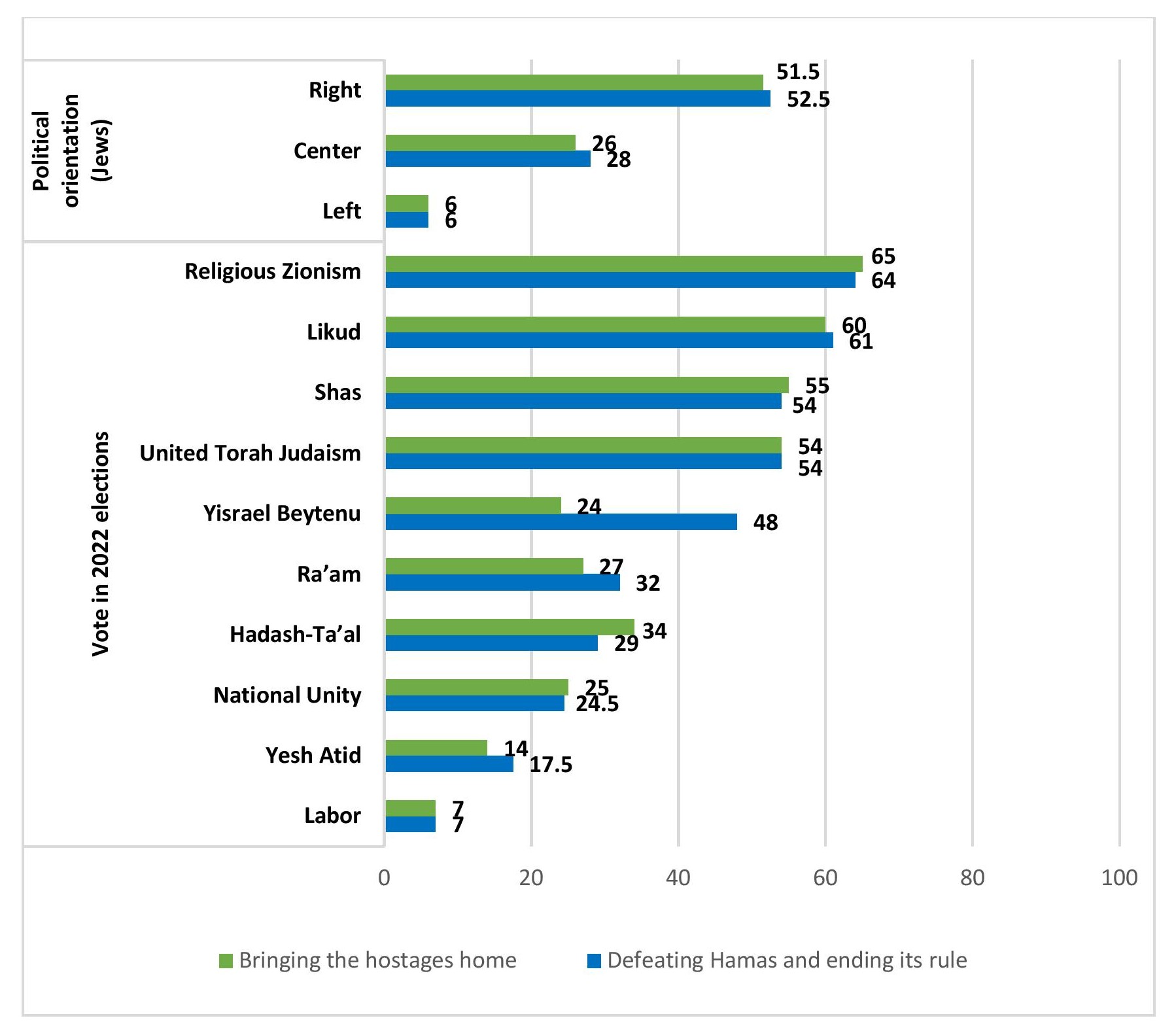
In light of the lively public debate on the issue of burnout among reserve forces and the repeated call-ups of reservists, we asked: “To what extent should decision-makers take into account the burden on reservists and their families when planning military operations?” We found a degree of consensus among our respondents that we have not encountered for some time. In the Jewish sample, 87% think that when planning military operations, the burden on reservists and their families should be taken into account to a fairly large or very large extent (9% take the opposite view, and 4% say they don’t know). A similar pattern was found in the Arab sample, though the share who think that consideration should be given to reservists and their families was slightly smaller, at 66%.
Breaking down responses in the Jewish sample by religiosity reveals that in all groups, the majority think that when planning military operations, the burden on reservists should be taken into account, though this majority is smallest among Haredi and national religious respondents.
Agree that when planning military operations, decision-makers should take into account the burden on reservists and their families (Jews, by religiosity; %)
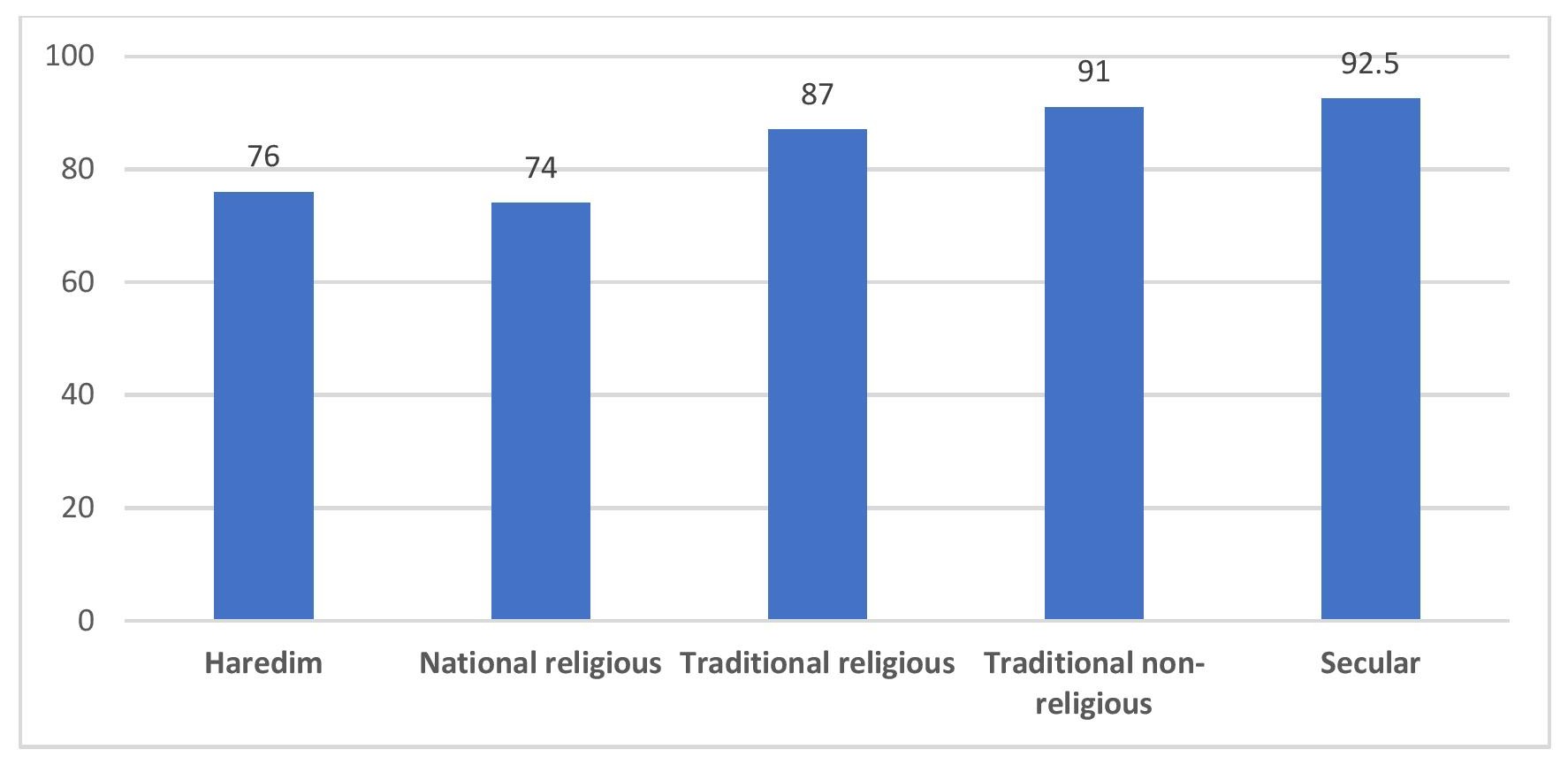
Immediately before and immediately after the election of President Trump, we found that very large proportions of Israelis were convinced that Israel’s security would be a guiding light for his policymaking (in November 2024, for example, we found that this was the opinion of 63% of respondents). At that time, there were also no significant differences on this question between Jews and Arabs.
However, the reality has proved to be somewhat different, and consequently there has been a decline in the share of those who are confident that this is a central consideration in shaping policy in Washington. In April of this year, we asked this question against the backdrop of the nuclear talks with Iran, and found a divided Israeli public: 45.5% thought that Trump was taking Israel’s security into account in these talks to a fairly large or very large extent, while 44% thought he was taking it into account to a fairly small or very small extent. This month, we asked, without referring to these talks or to Trump’s recent Middle East visit: “To what extent do you think Israel's security is one of President Trump’s central considerations?” Once again, we found that the total sample is divided, with 47% thinking that Israel’s security is indeed a central consideration for the president to a fairly large or very large extent, and 46% that is a central consideration only to a fairly small or very small extent.
This time, however, we found very different distributions of opinions among Jews and Arabs: 50% of Jewish respondents think that Israel’s security is a central consideration for Trump to a small or very small extent, and only 43% think that it is a central consideration to a fairly large or very large extent. By contrast, a large majority of Arab interviewees (66%) believe that this is a fairly central or very central consideration for Trump. Breaking down responses in the Jewish sample by political orientation reveals that the smallest share of respondents who think that Israel’s security is one of Trump’s main considerations is found on the Left, relative to the Center and the Right.
Think that the security of Israel is, to a large extent, one of President Trump’s central considerations (%)
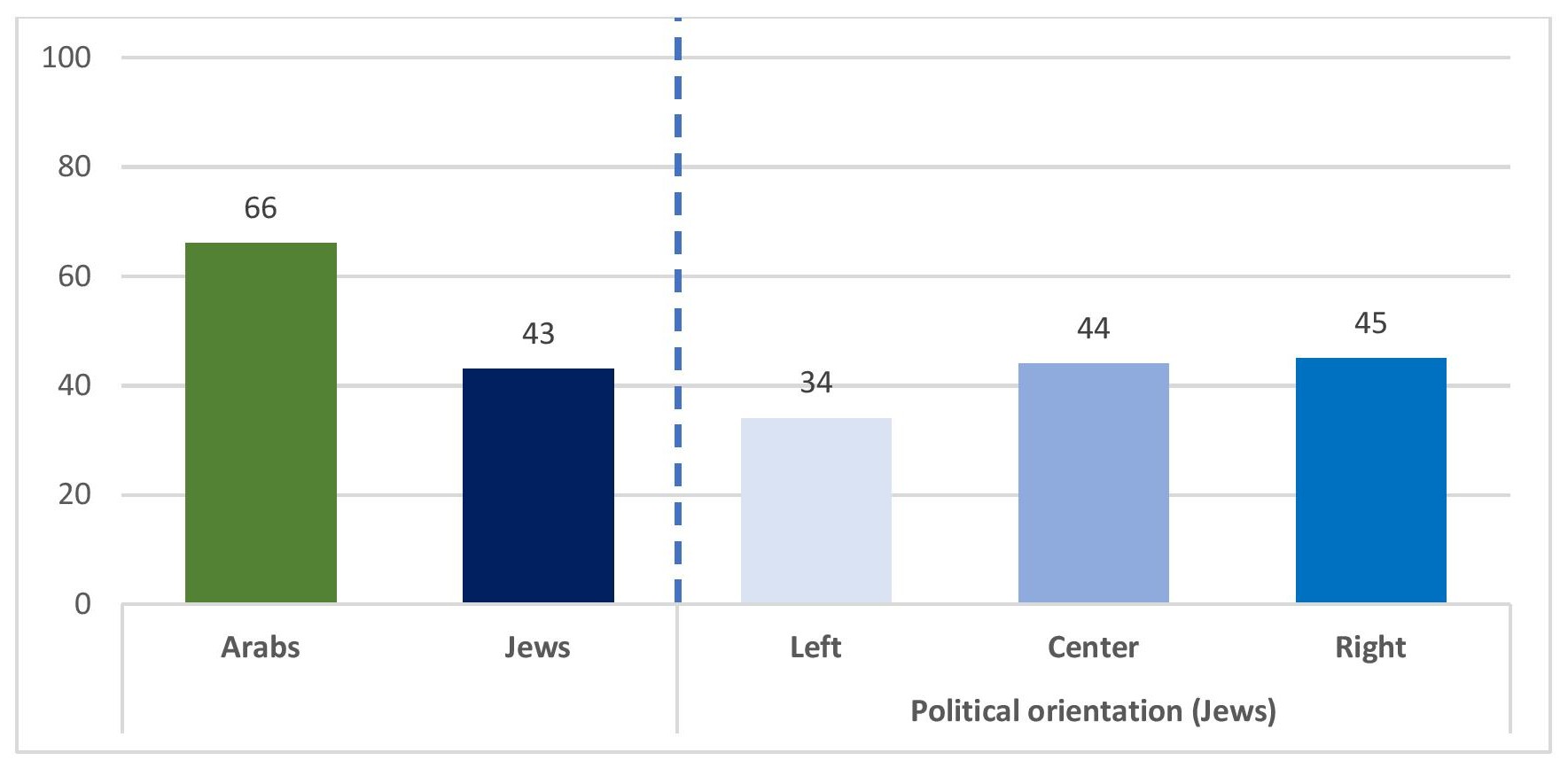
We asked: “Which of the following will cause the Houthis to cease firing on Israel: a ceasefire in Gaza; more attacks on Yemen by Israel; a diplomatic agreement with the Houthis; an Israeli attack on Iran; or nothing?” There is a sizable difference on this issue between Jewish and Arab respondents. Among Jews, the most common response (given by around a third of respondents) is that a ceasefire in Gaza will likely lead to an end to Houthi missile attacks on Israel, but in second place (around a quarter of Jewish respondents) is an Israeli attack on Iran. Among Arabs, too, the largest share (about half) think that a ceasefire in Gaza could stop the attacks, though a quarter cite a diplomatic agreement with the Houthis as the best option. Furthermore, Jews do not see an agreement with the Houthis as an effective means of ending the firing of missiles, while Arabs do not view Israeli attacks on Yemen as an effective approach.
Which of the following is most likely to cause the Houthis to cease firing on Israel? (%)
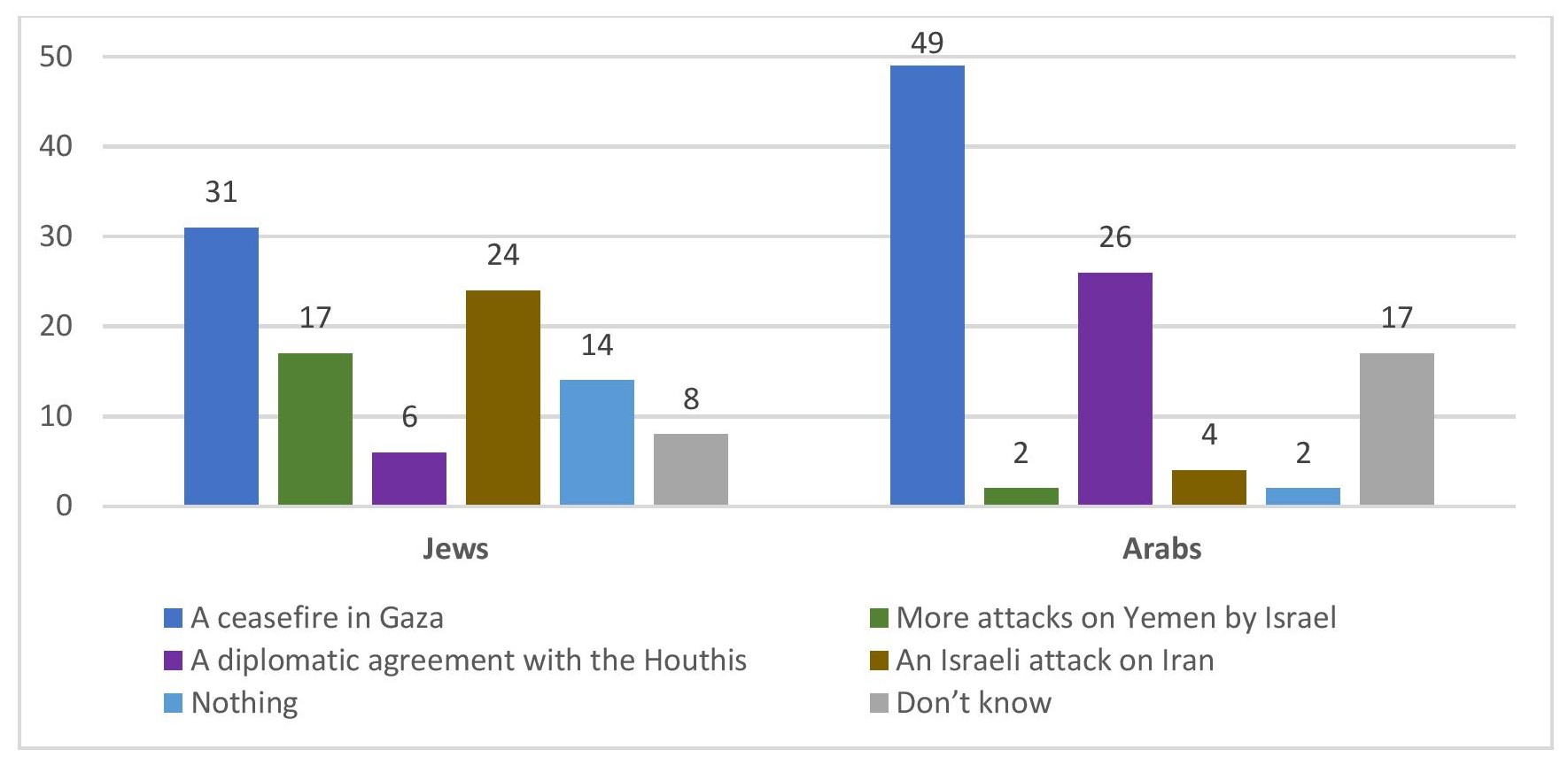
A breakdown of responses to this question by political orientation (Jews) reveals that a majority on the Left (55%) think that the Houthis will cease firing in the event of a ceasefire in Gaza (compared with 48% in the Center and just 21% on the Right). On the Right, the largest share (30%) think that the attacks can be halted by an Israeli attack on Iran—a view shared by just 7.5% on the Left and 18% in the Center. Those on the Right also attribute more effectiveness to an Israeli attack on Yemen than do those on the Left and in the Center (21%, as contrasted with 2.5% and 13%, respectively).
We asked: “In your opinion, what is the main reason for the new wave of flight cancellations by foreign airlines?” The majority (around 60%) of both Jewish and Arab respondents think that the main reason is the objective security situation. Identical shares of just over a quarter of respondents in both groups think that the cancellations stem from disagreement with Israel’s conduct in the war in Gaza.
In your opinion, what is the main reason for the new wave of flight cancellations by foreign airlines? (total sample; %)
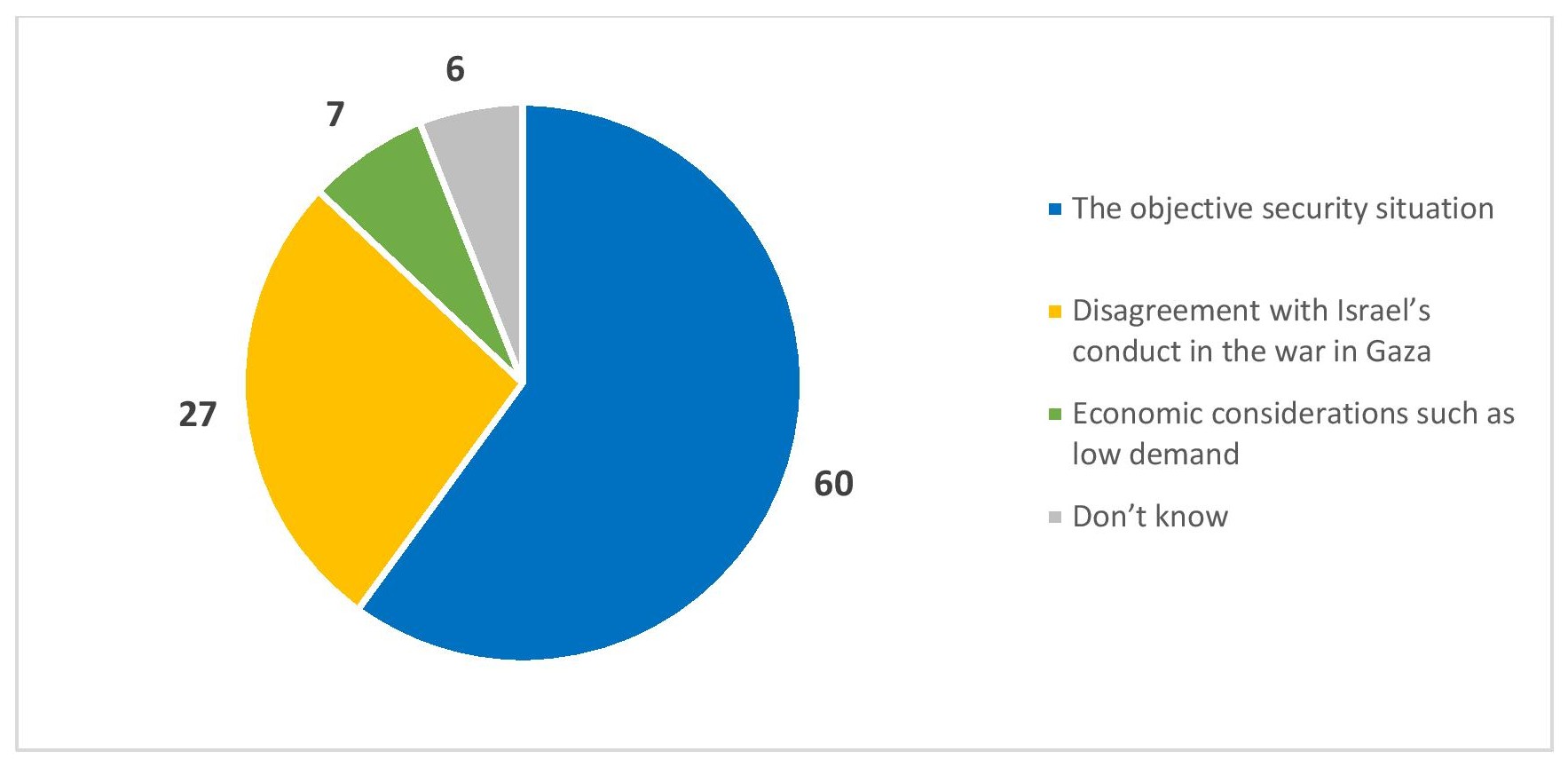
A breakdown of responses to this question by political orientation (Jews) reveals a majority in all three camps who attribute the flight cancellations to the objective security situation, though this majority is larger on the Left (69%) than in the Center (62%) and on the Right (58%).
The May 2025 Israeli Voice Index was prepared by the Viterbi Family Center for Public Opinion and Policy Research at the Israel Democracy Institute. The survey was conducted via the internet and by telephone (to include groups that are under-represented on the internet) between May 26–29, 2025, with 601 men and women interviewed in Hebrew and 150 in Arabic, constituting a nationally representative sample of the adult population in Israel aged 18 and over. The maximum sampling error was ±3.58% at a confidence level of 95%. Field work was carried out by Shiluv I2R. The full data file can be found at: https://dataisrael.idi.org.il.
